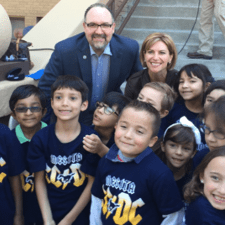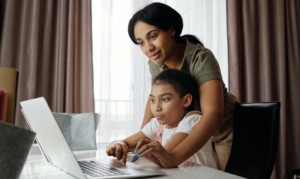Partnering with Parents on Social-Emotional Learning

By Juan Cabrera
If you spend time thinking about improving school systems, you know there are many levers we can pull to make an impact. Our challenge is finding the most important and critical levers for our particular communities and making sure we excel in those areas. As the Superintendent of a large, urban district near the border in Texas, finding the right levers is always on my mind.
When I visit with our El Paso ISD trustees and educators, we often brainstorm about making a deeper impact on our district. To this end, I am reflecting on what we can do to improve our partnerships with parents as a lever to improve student outcomes.
From my lens as a public school parent and a district administrator, I am frustrated by the many flaws in the area of parent communication and service (aka, customer service). Based on many informal visits with parents, I know there are many ways to improve communication and the ways in which we partner with parents. At a minimum, improved communication should help increase parental engagement in our schools, which will likely improve student engagement, but I am interested in exploring how parental engagement can have a more direct connection to improving student outcomes. More specifically, how can we work together to be sure our students are happy, well-rounded, and socially emotionally healthy human beings? How can we all work together to on social and emotional learning?

In El Paso, like other districts, there is a focus on state accountability. However, we also place a huge importance on social and emotional learning (SEL), and have joined a handful of districts across the country in aggressively focusing on these skills (see Initiative #2 in the EPISD 2020 Strategic Plan). We believe SEL is critical to the growth and development of our students and that there is the added benefit of helping our community focus on other measures of success–not just on state test scores.

I am proud of El Paso ISD educators for making this commitment to add SEL to their ever-increasing burden of meeting state academic standards. Despite the fact that SEL is not currently recognized by our state as a measure of success, we are committed to focusing on SEL programming in our schools.
We are proud to partner with CASEL (Collaborative for Academic, Social, and Emotional Learning) and other districts in the Council of the Great City Schools that recognize the importance of SEL.

Certainly, we care deeply about and are serious about meeting academic readiness standards, but we also want to help our students become better learners, team members and civic-minded citizens. Clearly teaching students the ability to manage themselves, to collaborate with others and make good decisions will not only make them better students and classmates, but also will make them better family members.
Because SEL is grounded in the understanding that the best learning emerges in the context of supportive relationships, partnering with parents and helping them understand the importance of SEL should have a dramatic impact on the growth and development of our students in EPISD. We also need to hear from parents what strategies they use at home. They, too, have great insights and ideas about how to develop these skills within students.
Undoubtedly, schools benefit greatly from parental involvement in academics, but while some parents may not be able or have the time to offer academic support, I am certain that most parents can support schools in developing SEL skills in students. Hopefully, many of our parents are focused on SEL at home, but we should make sure they are aware of our work in schools and what role they can play as parents to support this work.
In 2017, our district will work harder to improve parent engagement–specifically efforts to educate parents about the importance of social-emotional learning and the important role they can play at home.
Juan Cabrera is Superintendent of the El Paso Independent School District. For more from Juan, read www.edutransformed.com and follow on Twitter: @JECabrera12
For more, see:
- Embracing the Border Economy
- Active Learning Requires Innovative Learning Spaces
- Partnering to Create Quality Options
Stay in-the-know with all things EdTech and innovations in learning by signing up to receive the weekly Smart Update. This post includes mentions of a Getting Smart partner. For a full list of partners, affiliate organizations and all other disclosures, please see our Partner page.




0 Comments
Leave a Comment
Your email address will not be published. All fields are required.